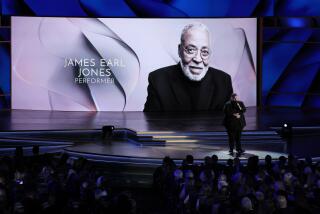Allen Ginsberg Memorial Flows With Stars and Time
“Allen Ginsberg’s America” might have come a little late to the Ginsberg memorial game--observances have already been held in L.A. and several other cities since the poet’s death in April at age 70--but the event, held Saturday at the Wadsworth Theater, made up for it in sheer bulk.
Clocking in at 5 1/2 hours, the program of poetry, music, performance art, drawing, raconteuring and film clips reflected the scale of Ginsberg’s influence on the century’s literary and popular culture. But the show’s planners should have heeded the Ginsberg writing tip cited by one of the evening’s poets: “Keep the best, throw out the rest.”
The combination of Ginsberg’s stature, a low ticket price (proceeds benefited the poetry scholarship fund at the Naropa Institute in Boulder, Colo.) and an intriguing lineup, drawn from both the poet’s inner circle and his more distant admirers, packed the place with L.A.’s literati.
Although the two marquee names from the avant-garde and the mainstream--William S. Burroughs and Jack Nicholson, respectively--were no-shows, the program got rolling with the energy and rhythm of a Ginsberg poem: reminiscences from his friend and a key event organizer, Dr. Oscar Janiger, a ‘60s television clip of Ginsberg charming his philosophical foe William F. Buckley, Tom Waits singing a Jack Kerouac song, as well as poems and songs from longtime Ginsberg colleagues Anne Waldman and the Fugs’ Ed Sanders and Steve Taylor.
Messages were read from Kurt Vonnegut and Norman Mailer (the latter by Ed Asner). Ginsberg’s niece Ann Brooks read a poem by her father, Ginsberg’s brother Eugene Brooks. Burroughs sent along a typically droll but surprisingly sweet taped eulogy, and the words of Blake and Whitman resonated regularly with those of Ginsberg.
But in an evening marked by such literary stars as Tom Robbins, the knockout punch came from an unexpected source--bandleader Artie Shaw, whose rambling, digression-filled tale of a strange gig in Texas had little to do with Ginsberg per se but captured a kindred spirit of iconoclasm that thoroughly charmed the audience.
That would have been a pretty good show right there, and much of the event’s long second half was memorable, from Johnny Depp’s reading of a Hunter S. Thompson dispatch to a three-quarters reunion of the Firesign Theatre.
But with the audience thinning, the speakers and performers began running out of new aspects to add to the mix. The fund-raising pitch for the Naropa Institute was also ill-timed--any preacher worth his pulpit knows to pass the collection plate when the house is full.
But the guest of honor himself probably wouldn’t have complained about any of this--his tirelessness and his deep tolerance were two of the qualities cited by the participants as they assembled, in memory, music and verse, a mosaic portrait that was both heroic and intimate.
More to Read
The biggest entertainment stories
Get our big stories about Hollywood, film, television, music, arts, culture and more right in your inbox as soon as they publish.
You may occasionally receive promotional content from the Los Angeles Times.










